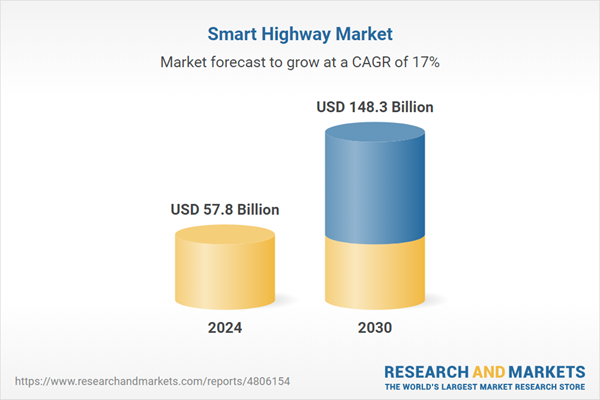Global Smart Highway Market - Key Trends & Drivers Summarized
Smart highways represent a transformative approach to transportation infrastructure, leveraging cutting-edge technologies to enhance road safety, traffic management, and overall driving experience. These highways integrate various technologies such as IoT sensors, intelligent traffic management systems, and advanced communication networks to monitor and manage traffic flow in real-time. For instance, embedded sensors can detect road conditions, vehicle speeds, and congestion levels, transmitting this data to centralized systems that optimize traffic signals and provide timely information to drivers. This technology reduces traffic jams, minimizes accidents, and improves the efficiency of road networks. Additionally, smart highways often incorporate renewable energy solutions like solar panels and wind turbines, embedded within or alongside the road, to power streetlights and other infrastructure components, contributing to sustainability and energy efficiency.One of the most significant advancements in smart highways is the development of autonomous vehicle support systems. These systems include dedicated lanes for self-driving cars, equipped with sensors and communication devices that facilitate vehicle-to-infrastructure (V2I) and vehicle-to-vehicle (V2V) communication. This infrastructure ensures that autonomous vehicles can navigate safely and efficiently, even in complex traffic scenarios. Moreover, smart highways feature dynamic lane management systems that can adapt to changing traffic conditions, such as opening additional lanes during peak hours or adjusting speed limits based on weather conditions. The integration of these technologies not only enhances safety and reduces congestion but also supports the broader adoption of autonomous vehicles by providing a reliable and adaptable environment for their operation.
The growth in the smart highway market is driven by several factors, including advancements in sensor technology, increasing demand for sustainable transportation solutions, and the rising adoption of autonomous vehicles. The continuous innovation in IoT and communication technologies has made it feasible to implement sophisticated traffic management systems that can handle vast amounts of data and provide real-time analytics. Additionally, the push towards reducing carbon emissions and enhancing energy efficiency has encouraged governments and organizations to invest in smart highway projects that incorporate renewable energy sources and electric vehicle (EV) charging stations. Consumer behavior also plays a crucial role, as there is a growing preference for safer and more efficient transportation options. The increase in traffic congestion in urban areas and the need for improved road safety have further accelerated the adoption of smart highway technologies. As urbanization continues to rise and the demand for advanced transportation infrastructure grows, the smart highway market is poised for significant expansion, driven by technological advancements and evolving consumer expectations.
Report Scope
The report analyzes the Smart Highway market, presented in terms of market value (USD). The analysis covers the key segments and geographic regions outlined below.- Segments: Component (Hardware, Software, Services); Technology (Intelligent Transportation Management, Intelligent Traffic Management, Communication, Monitoring).
- Geographic Regions/Countries: World; United States; Canada; Japan; China; Europe (France; Germany; Italy; United Kingdom; and Rest of Europe); Asia-Pacific; Rest of World.
Key Insights:
- Market Growth: Understand the significant growth trajectory of the Smart Highway Hardware segment, which is expected to reach US$80.7 Billion by 2030 with a CAGR of 15.5%. The Smart Highway Software segment is also set to grow at 19.8% CAGR over the analysis period.
- Regional Analysis: Gain insights into the U.S. market, valued at $23.6 Billion in 2024, and China, forecasted to grow at an impressive 19.6% CAGR to reach $10.7 Billion by 2030. Discover growth trends in other key regions, including Japan, Canada, Germany, and the Asia-Pacific.
Why You Should Buy This Report:
- Detailed Market Analysis: Access a thorough analysis of the Global Smart Highway Market, covering all major geographic regions and market segments.
- Competitive Insights: Get an overview of the competitive landscape, including the market presence of major players across different geographies.
- Future Trends and Drivers: Understand the key trends and drivers shaping the future of the Global Smart Highway Market.
- Actionable Insights: Benefit from actionable insights that can help you identify new revenue opportunities and make strategic business decisions.
Key Questions Answered:
- How is the Global Smart Highway Market expected to evolve by 2030?
- What are the main drivers and restraints affecting the market?
- Which market segments will grow the most over the forecast period?
- How will market shares for different regions and segments change by 2030?
- Who are the leading players in the market, and what are their prospects?
Report Features:
- Comprehensive Market Data: Independent analysis of annual sales and market forecasts in US$ Million from 2024 to 2030.
- In-Depth Regional Analysis: Detailed insights into key markets, including the U.S., China, Japan, Canada, Europe, Asia-Pacific, Latin America, Middle East, and Africa.
- Company Profiles: Coverage of players such as Cisco Systems Inc., Conduent, Inc., Huawei Technologies Co., Ltd., IBM Corporation, Indra Sistemas S.A. and more.
- Complimentary Updates: Receive free report updates for one year to keep you informed of the latest market developments.
Some of the 110 companies featured in this Smart Highway market report include:
- Cisco Systems Inc.
- Conduent, Inc.
- Huawei Technologies Co., Ltd.
- IBM Corporation
- Indra Sistemas S.A.
- KapschTrafficCom AG
- LG CNS Corporation
- Nokia Corporation
- Siemens AG
This edition integrates the latest global trade and economic shifts into comprehensive market analysis. Key updates include:
- Tariff and Trade Impact: Insights into global tariff negotiations across 180+ countries, with analysis of supply chain turbulence, sourcing disruptions, and geographic realignment. Special focus on 2025 as a pivotal year for trade tensions, including updated perspectives on the Trump-era tariffs.
- Adjusted Forecasts and Analytics: Revised global and regional market forecasts through 2030, incorporating tariff effects, economic uncertainty, and structural changes in globalization. Includes historical analysis from 2015 to 2023.
- Strategic Market Dynamics: Evaluation of revised market prospects, regional outlooks, and key economic indicators such as population and urbanization trends.
- Innovation & Technology Trends: Latest developments in product and process innovation, emerging technologies, and key industry drivers shaping the competitive landscape.
- Competitive Intelligence: Updated global market share estimates for 2025, competitive positioning of major players (Strong/Active/Niche/Trivial), and refined focus on leading global brands and core players.
- Expert Insight & Commentary: Strategic analysis from economists, trade experts, and domain specialists to contextualize market shifts and identify emerging opportunities.
Table of Contents
Companies Mentioned (Partial List)
A selection of companies mentioned in this report includes, but is not limited to:
- Cisco Systems Inc.
- Conduent, Inc.
- Huawei Technologies Co., Ltd.
- IBM Corporation
- Indra Sistemas S.A.
- KapschTrafficCom AG
- LG CNS Corporation
- Nokia Corporation
- Siemens AG
Table Information
| Report Attribute | Details |
|---|---|
| No. of Pages | 543 |
| Published | February 2026 |
| Forecast Period | 2024 - 2030 |
| Estimated Market Value ( USD | $ 57.8 Billion |
| Forecasted Market Value ( USD | $ 148.3 Billion |
| Compound Annual Growth Rate | 17.0% |
| Regions Covered | Global |









